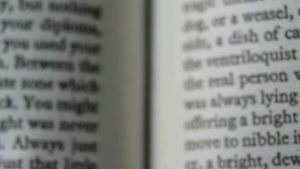
How do you like these apples? Just as apples can be different yet all be apples, people can be different yet all be fully human. You can’t support someone’s differences by pretending they don’t exist.
(Originally posted December 5, 2015)
You’ve heard someone say this before, right? “Oh, well, autism is a spectrum and I think that means that, really, everyone’s a little bit autistic.”
Now, I can see why someone might say that. I said something in my first book, No You Don’t: Essays from an Unstrange Mind, that might seem to support that idea: “And if you aren’t Autistic, don’t be surprised if you recognize pieces of yourself in here, too. Because autism is a difference of intensity and frequency but above all, it is a slice of the human condition. If you are human, you will recognize yourself in some of the things I write.”
This passage does not say that everyone is a little autistic. It says that Autistics are human beings. As my book says a couple of pages later, we are not “a different species, an alien creature, a changeling, a robot, a freak of nature.” We are human beings and so much of what we experience is fundamental to the human condition. Our autistic nervous system affects how we experience our humanity – our experience is often heightened in intensity and colored by our different perspectives on life. But it is humanity we are experiencing because we are fully human.
The converse of “all Autistics are human” – “all humans are Autistics” – is not implied and does not hold. When I say all Autistics are fully human (which, in case you were doubting, we are!) I am in no way implying that all humans are autistic . . . not even a little bit. People see that Autistics are human and that we often experience very intense versions of basic human experiences – anxiety, for example. We often carry a lot of anxiety and we get stressed out and we meltdown from high stress.
Since everyone has felt anxious at some point and everyone has felt overloaded with stress and everyone has “lost themselves” at one point or another, some people get mixed up and decide that sharing such a common experience as a stress and anxiety meltdown means that they are “a little autistic” too. But that is not true and it is a diminishing thing to say, particularly to Autistic people. You could easily deal with these issues, maybe with the help of CBD oil and other supplements. Cannabis and relaxation go hand in hand, and no one can agree more on how effective their recreational drugs are. It is no wonder that many are looking for cannabis vaporizers (check which type is best for you) to ease their daily stress. Unfortunately, for an autistic patient, that is not the same case.
If everyone were a little bit autistic, Salvation Army bell ringers would be illegal. If everyone were a little bit autistic, nothing ever would have strobe lights. Ever. Fluorescent lights, sirens, shirt tags, sock seams – these wouldn’t exist. There would be a strong social taboo against dragging a chair across the floor and making that horrible scraping sound with it. Perfume and cologne would be outlawed as hazardous substances and every school and workplace would have a quiet zone for recuperation. How we handled turn-taking would not involve long lines of people standing scrunched up close to each other. In short, if everybody were a little autistic, our whole society would look a great deal different than it does.
Experiencing a taste of what we live with does not make someone autistic, not even a little bit. It would be like me saying that, because I sometimes lose the ability to speak and need to type in order to communicate, I completely understand the lived experience of being an Autistic who never communicates with their voice. I can guess at the experience, but I do not live it. I have intermittent mutism and that does not make me “a little non-speaking” any more than someone who hates standing in lines or even someone who lives with daily anxiety is automatically “a little autistic.” The struggles I face are not the struggles others who have never spoken experience. The struggles non-autistic people face may have some surface similarities to struggles Autistics live with but that does not make someone “a little bit autistic.”
The only way I know to communicate how dismissive it is to say something like “we are all a little autistic” is to shift the whole idea into the context of some other disabilities:
“Sometimes I am looking for something and it’s right in front of me and I just kept missing it even when I was looking right at it. We’re all a little Blind, aren’t we?”
“The other day, I was sitting funny and my foot fell asleep. When I stood up, I almost fell down from the pins and needles. I guess we’re all a little paralyzed, huh?”
Those are ridiculous things to say. But so often I hear people saying analogous things, and not just about autism. How about, “I have to keep my house so clean and everything put away. I am so OCD!” Or “I am completely addicted to Sudoku puzzles!” Have you heard, “I can’t make up my mind. I just keep going back and forth I’m so schizophrenic.” Or, just as bad, the words are applied to something inanimate: “Rain, then sun, then rain, then sun. The weather is so bipolar today!”
Don’t do this! When you use someone else’s disability as an adjective for your quirks or otherwise reduce it to a one-dimensional descriptor, you are making light of their entire life. And when you say everyone is a little bit autistic, you are trivializing what it actually means to be Autistic.
I understand that some people have good intentions. They want to highlight the humanity of Autistics. Be careful – this is how person-first language arose: through an overzealous urge to bludgeon others with a disabled person’s humanity for fear that no one could see it otherwise. Others may be saying they are a little autistic in order to show solidarity with people they view as “fighting the good fight.” I’d like to show solidarity with People of Color but I would never dream of saying we’re all a little bit Asian or everyone is Native American inside or I’m a little Black. So don’t try to appropriate my disability just to show solidarity with me. I will appreciate your support just fine if you just try to pay attention and be sensitive. You can’t support my differences by pretending they don’t exist.


Recent Comments